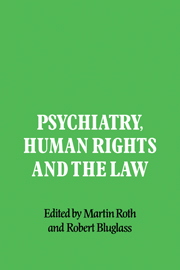Book contents
- Frontmatter
- Contents
- Editors' preface
- Contributors
- The historical background: the past 25 years since the Mental Health Act of 1959
- The social and medical consequences of recent legal reforms of mental health law in the USA: the criminalization of mental disorder
- The recent Mental Health Act in the United Kingdom: issues and perspectives
- Medical and social consequences of the Italian Psychiatric Care Act of 1978
- Lessons for the future drawn from United States legislation and experience
- Recent developments in relation to mental health and the law in the Federal Republic of Germany
- Psychopathy and dangerousness
- Dangerousness in social perspective
- Psychiatric explanations as excuses
- Detention of patients: administrative problems facing Mental Health Review Tribunals
- Developments in forensic psychiatry services in the National Health Service
- The role of psychiatry in prisons and ‘the right to punishment’
- Human rights in mental health
- Changes in mental health legislation as indicators of changing values and policies
- The Danish experience: one model of psychiatric testimony to courts of law
- A postscript on the discussions at the Cambridge Conference on Society, Psychiatry and the Law
A postscript on the discussions at the Cambridge Conference on Society, Psychiatry and the Law
Published online by Cambridge University Press: 04 August 2010
- Frontmatter
- Contents
- Editors' preface
- Contributors
- The historical background: the past 25 years since the Mental Health Act of 1959
- The social and medical consequences of recent legal reforms of mental health law in the USA: the criminalization of mental disorder
- The recent Mental Health Act in the United Kingdom: issues and perspectives
- Medical and social consequences of the Italian Psychiatric Care Act of 1978
- Lessons for the future drawn from United States legislation and experience
- Recent developments in relation to mental health and the law in the Federal Republic of Germany
- Psychopathy and dangerousness
- Dangerousness in social perspective
- Psychiatric explanations as excuses
- Detention of patients: administrative problems facing Mental Health Review Tribunals
- Developments in forensic psychiatry services in the National Health Service
- The role of psychiatry in prisons and ‘the right to punishment’
- Human rights in mental health
- Changes in mental health legislation as indicators of changing values and policies
- The Danish experience: one model of psychiatric testimony to courts of law
- A postscript on the discussions at the Cambridge Conference on Society, Psychiatry and the Law
Summary
The indivisibilxity of the problems of mental health
The indivisibility of the manifold aspects of mental health, ‘the seamless web of the subject’ in the words of Dr Margaret Somerville, was in evidence in all the discussion sessions during the Cambridge Conference on Society, Psychiatry and the Law.
The dismantling of many of the large mental hospitals and the total ‘open door’ policies pursued in most of those that remain in many parts of the world, the steadily growing number of mentally ill in the community, many of them homeless and isolated, the overcrowding of the prisons and the bottlenecks in the Special Hospitals such as Broadmoor, represent one facet of the problem. The radical critique of psychiatric hospitals and other institutions and their dehumanising effects, and the civil rights campaigns for the right to receive or to refuse psychiatric treatment and the right of offenders to opt for punishment without benefit of psychiatry, comprise another aspect. The tide of new legislation in relation to the care of the mentally ill in many countries and the mutual disenchantment that has evolved between psychiatry and the law within the last two decades make up a third part of the picture. All appear closely entangled with each other.
Reports from the United States, Canada and several European countries regarding the predicament of the growing number of mentally ill persons discharged in recent years from mental hospitals into the community depicted a situation consistent in its main features throughout the affluent parts of the world.
- Type
- Chapter
- Information
- Psychiatry, Human Rights and the Law , pp. 228 - 241Publisher: Cambridge University PressPrint publication year: 1985

